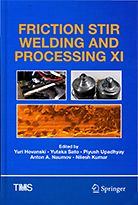Friction S tir Welding and Processing XI - Yuri Hovanski, Yutaka Sato, Piyush Upadhyay, Anton A. Naumov, Nilesh Kurnar
Editors
- Yuri Hovanski - Brigham Young University, Provo, UT, USA
- Yutaka Sato - Tohoku University, Sendai, Japan
- Piyush Upadhyay - Pacific Northwest National Laboratory, Richland, WA, USA
- Anton A. Naumov, Peter the Great St. Petersburg Polytechnic, University Saint Petersburg, Russia
- Nilesh Kurnar - The University of Alabama, Tuscaloosa, AL, USA
ISSN 2367-1181
ISSN 2367-1696 (electronic)
The Minerals, Metais & Materials Series
ISBN 978-3-030-65264-7
ISBN 978-3-030-65265-4 (eBook)
This collection presents fundamentais and the current status of friction stir welding (FSW) and solid-state friction stir processing of materials, and provides researchers and engineers with an opportunity to review the current status of the friction stir related processes and discuss the future possibilities. Contributions cover various aspects of friction stir welding and processing including their derivative technologies. Topics include but are not limited to:
- Derivative technologies
- High-temperature lightweight applications
- Industrial applications
- Dissimilar alloys andlor materials
- Controls and nondestructive examination
- Simulation
- Characterization
These proceedings represent the 11th symposium on Friction S tir Welding and Processing (FSW/P) heldunder the auspices of The Minerals, Metais & Materials Society. These historie proceedings represent 30 years of study, research, and implementation since the initial FSW patent was filed in 1991. The continued interest and participation in this syroposiurn and the associated proceedings are an indirect testimony of the growth of this field.
For 2021, a total of 61 abstracts were submitted, which include 8 oral sessions. There are 20 papers included in this volume, which when combined with the previous 10 proceedings' publications represent more than 325 papers over a 22-year period. These submissions cover all aspects of friction stir technologi es including FSW of high melting temperature materials, FSW of lightweight materials, FSW of dissimilar materials, simulation of FSW/P, controls and inspection of FSW /P, and derivative technologies like friction stir processing, friction stir spot welding, additive friction stir, and friction stir extrusion.

